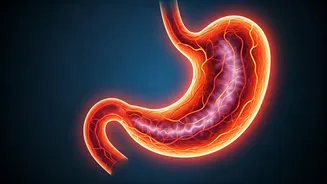Iron Deficiency Unveiled
Iron, a critical element, plays a vital role in carrying oxygen throughout the body. When iron levels dip, it can lead to various symptoms. One common
sign is persistent fatigue, as your body struggles to get enough oxygen to cells, leading to tiredness and exhaustion even after adequate rest. Brain fog, or difficulty concentrating and thinking clearly, is another symptom because insufficient oxygen impairs brain function. Other potential indicators include pale skin, headaches, and shortness of breath during physical activities. If you observe any of these symptoms, it's essential to consult with a healthcare professional for diagnosis and appropriate management strategies, such as iron-rich diet adjustments or supplementation.
Fibre Deficiency Signals
Fibre, primarily found in plant-based foods, is essential for healthy digestion and overall well-being. A lack of fibre can trigger various early warning signs. Common symptoms include persistent constipation, as fibre helps to regulate bowel movements and prevent stool from becoming hard and difficult to pass. You might also experience an increased appetite, as fibre promotes fullness, and its absence can lead to frequent hunger pangs and overeating. Bloating and abdominal discomfort are also indicative of fibre deficiency, as poor digestion causes gas buildup. Maintaining a diet that includes plenty of fruits, vegetables, and whole grains is important for preventing these symptoms. If these issues persist, it's advisable to speak to your doctor about your diet.
Protein Deficiency Indicators
Protein, the body's building block, is indispensable for cell repair, muscle maintenance, and various bodily functions. Protein deficiency can manifest itself through various subtle yet important early warning signals. Increased cravings for sweets or carbohydrates can arise due to the body's attempt to compensate for the lack of protein, which impacts blood sugar levels. You may find yourself experiencing frequent infections, as protein deficiency impairs the immune system's ability to fight off illnesses. Additionally, the loss of muscle mass is a common sign because protein is crucial for building and maintaining muscles. Hair loss, and brittle nails are further indicators since protein is a key component of hair and nails. Ensuring a diet rich in protein through foods like lean meats, beans, and dairy products is important.
Zinc Deficiency Symptoms
Zinc, a vital mineral, supports immune function, wound healing, and cell growth. Zinc deficiency can present with several noticeable early warning signs. Frequent colds or infections can be an indicator, as zinc is essential for a robust immune system. Skin issues, such as slow wound healing and persistent acne, may indicate a deficiency since zinc is key for cell repair. Hair loss is another potential symptom, because zinc contributes to hair health. Changes in taste or smell sensitivity can occur, since zinc plays a role in these senses. If you experience these symptoms, especially in combination, it's essential to assess your zinc intake. Foods like nuts, seeds, and meats are zinc-rich.
Calcium Deficiency Alerts
Calcium, primarily recognized for its role in bone health, is also critical for muscle function and nerve transmission. Early signs of calcium deficiency may include muscle cramps and spasms because calcium plays a key role in muscle contraction and relaxation. Tooth decay or weakening of the teeth can result from insufficient calcium intake. You may also notice brittle nails as calcium helps maintain their strength. Fatigue and overall weakness can be experienced as well. Ensuring adequate calcium intake through dairy products, leafy greens, and fortified foods is critical for preventing these issues. If you have any concerns, consult with your healthcare provider to discuss dietary adjustments or supplementation options.



















